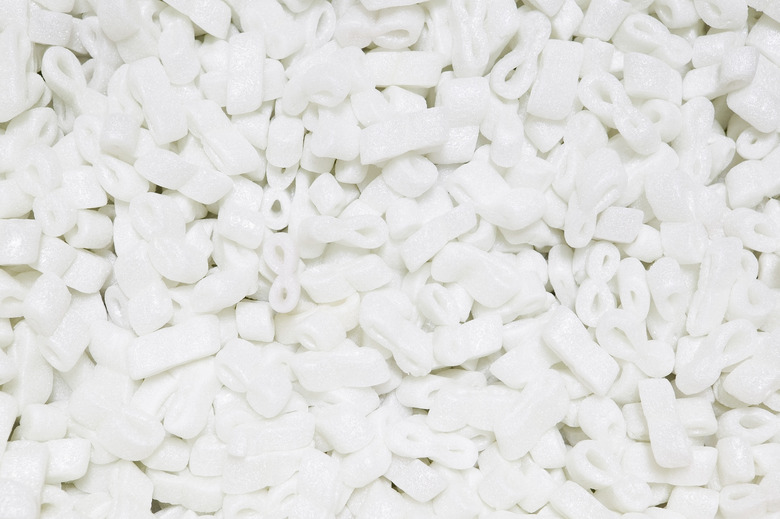What To Give Your Dog If He Eats Packing Peanuts
What is the risk of danger to dogs that have eaten packing peanuts? That depends on the type of packing peanuts they ate: the original version made from polystyrene or the newer, biodegradable kind, which are made from corn/potato starches or grains. The originals are potentially very dangerous when ingested; the biodegradable ones are less dangerous but can still cause choking, bowel obstruction, or other problems. Call your vet immediately if your dog has eaten either kind, or call the ASPCA Animal Poison Control Center at (888) 426-4435.
Try the 'dissolvable packing peanuts' test
Try the 'dissolvable packing peanuts' test
Biodegradable packing peanuts, or so-called edible packing peanuts, are made from starches and grains so they dissolve in water in minutes. While calling your vet, toss a few of the packing peanuts into a bowl of water, or just hold them under running water, and see what happens. If they begin to dissolve, they are the less dangerous, biodegradable peanuts. If nothing happens to them, assume they are the old, polystyrene variety. These last for hundreds of years in landfills, so they're not going to break down the way food does in a dog's intestines.
Polystyrene peanuts are also dangerous because they're made from petroleum products, which are considered to be carcinogens, or capable of causing cancer. No one really knows how long the chemicals they contain may stay in an animal's body, so the dog isn't in the clear after pooping out the peanuts. Either type of packing peanuts can also cause choking or intestinal blockage. While biodegradable packing peanuts do dissolve, some pieces could still be large enough to cause digestive issues.
Symptoms of abdominal distress
Symptoms of abdominal distress
Vomiting, especially several times, is the number one sign of intestinal blockage in dogs. Diarrhea is not typically a symptom since the intestines are blocked. Dogs also show abdominal discomfort or pain by stretching, hunching their backs, whining, loss of appetite, bloating, and generally not being able to get comfortable lying down. Watch for these types of symptoms, as your vet will likely ask about the dog's behavior.
Never induce your dog to vomit on your own
Never induce your dog to vomit on your own
Depending what was eaten and how much time has elapsed since, it can be dangerous and/or ineffective to make a dog vomit. Toxic substances that were harmful going down can cause problems again on their way up. The internet abounds with "home remedies" to make dogs vomit that are dangerous and should not be tried. And if the peanuts are already in the dog's intestines, vomiting will not help. Most vets have injectable medications that are safe and very effective in inducing vomiting.
What if you are told to induce vomiting in your dog?
What if you are told to induce vomiting in your dog?
If you cannot get to your vet within a 30-minute time frame, Animal Poison Control may instruct you to induce vomiting at home. You should have hydrogen peroxide (3%) in your medicine cabinet, as it has many uses, including emergencies such as this. Although Ipecac syrup will also induce vomiting, it can be dangerous, so most vets or poison control centers will recommend using hydrogen peroxide. The amount to give depends on your dog's weight and other factors, so give exactly and only the amount instructed. After inducing vomiting, you will most likely be told to bring your dog to the vet for further evaluation and treatment.
Prevent your dog from eating packing material
Prevent your dog from eating packing material
The best way to keep a dog from eating packing peanuts is to get rid of the materials. Biodegradable packing peanuts can be dissolved in water and will not harm plumbing once they are dissolved. Polystyrene peanuts are trickier to get rid of because only a few specialized recycling centers will take them. Putting them in the trash means they will end up in a landfill and/or the oceans where other animals, birds, and fish may swallow them. Shippers in your area may accept and reuse packing peanuts; churches and schools may also use them in art projects.
References
- American Society for the Prevention of Cruelty to Animals: Is it Ever Safe to Induce Vomiting?
- National Canine Research Association of America: What to Do if Your Dog Ate Styrofoam or Packing Peanuts
- Earth 911: How to Recycle Packing Peanuts
- AKC: Bowel Obstruction In Dogs: Symptoms, Treatment, and Prevention
- Milhench: Packing Peanuts, Are They Really Biodegr
